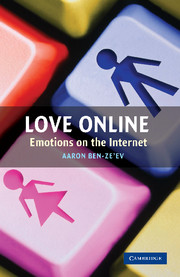Book contents
- Frontmatter
- Contents
- Preface
- 1 The seductive space
- 2 The paradoxical nature of online relationships
- 3 Emotions on the Net
- 4 Online imagination
- 5 Online privacy and emotional closeness
- 6 Is it worth it?
- 7 Flirting on- and offline
- 8 Cyberlove
- 9 Chatting is sometimes cheating
- 10 The future of romantic relationships
- Notes
- Bibliography
- Index
2 - The paradoxical nature of online relationships
Published online by Cambridge University Press: 22 September 2009
- Frontmatter
- Contents
- Preface
- 1 The seductive space
- 2 The paradoxical nature of online relationships
- 3 Emotions on the Net
- 4 Online imagination
- 5 Online privacy and emotional closeness
- 6 Is it worth it?
- 7 Flirting on- and offline
- 8 Cyberlove
- 9 Chatting is sometimes cheating
- 10 The future of romantic relationships
- Notes
- Bibliography
- Index
Summary
I date this girl for two years – and then the nagging starts: “I wanna know your name …”
Mike BinderAfter discussing some of the novel aspects of cyberspace in the previous chapter, I turn now to discuss the nature of online relationships. I will show that such novelty, and in particular the interactive nature of virtual reality, offers us a new type of personal relationship. Such relationships characteristically have features typical of both close and remote offline relationships. The coexistence of these opposing features cannot be found in offline relationships. Although my discussion is focused upon heterosexual relationships, most of the claims are valid for homosexual or bisexual relationships as well.
Detached attachment
If it weren't for the fact that the TV set and the refrigerator are so far apart, some of us wouldn't get any exercise at all.
Joey AdamsA friend of mine told me that when he was married to his second wife, he met a wonderful woman and fell deeply in love with her. He did not know how to solve his difficult situation and after long deliberations he came up with the following brilliant idea: their relationship, he suggested, would be that of detached attachment. The woman replied that this was not close enough for her. He then got divorced and married this woman, with whom he still lives happily.
- Type
- Chapter
- Information
- Love OnlineEmotions on the Internet, pp. 26 - 57Publisher: Cambridge University PressPrint publication year: 2004



